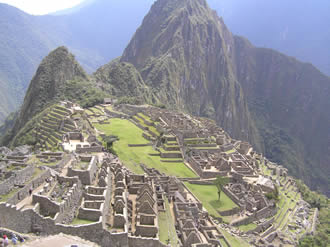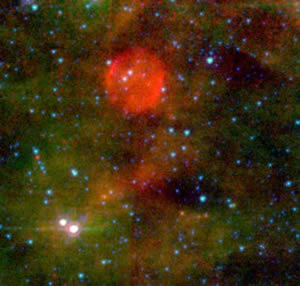Heaven:
Our "Enduring Fascination"
For Sunday November 14, 2010
Lectionary Readings (Revised Common Lectionary, Year C)
Isaiah 65:17–25 or Malachi 4:1–2a
Isaiah 12 or Psalm 98
2 Thessalonians 3:6–13
Luke 21:5–19
In her new book Heaven: Our Enduring Fascination with the Afterlife (2010), Lisa Miller, the religion editor for Newsweek magazine, explores humanity's universal longing for life after death. Not every religion describes heaven in the same way, of course. And as Miller shows, belief in the afterlife has led to remarkably selfless service as well as ruthless mass murder.
The End of human history and the entire cosmos is a scientific certitude (see below). It's also central to almost every Christian confession. Every week in my church the priest invites our congregation to "proclaim the mystery of faith," to which we respond, "Christ has died. Christ has risen. Christ will come again."
 |
Elderly Japanese woman. |
Not just wing nut fanatics, but most thoughtful people wonder, "what happens at the end of history?" I've come to think about this question in four broad ways — personal, civilizational, global, and cosmic.
If you're a male in Liberia, your life expectancy at birth is 39 years. If you're lucky enough to be born a woman in Japan, demographers estimate that you'll live more than twice that long, about 84.7 years. But no matter who you are or where you're born, mortality rates are 100%. Then comes your personal End — either personal annihilation and absolute nothingness or "magic power" of some sort. People like to quote the famous atheist Bertrand Russell who once said, "I believe that when I die, I will rot." But as Miller shows in her book, almost every people and culture of every time and place has believed some version of an afterlife.
Archaeological ruins like the huge and haunting moai statues on Easter Island in the South Pacific, or the Incan architecture of the "lost city" of Machu Picchu, remind us that entire cultures have collapsed. Environmental experts like Jared Diamond (Collapse, 2005) speak of civilizational or cultural death. His twenty case studies show how some of history's most advanced civilizations have vanished. Without major course corrections, many social-scientific studies predict apocalyptic scenarios due to nuclear weapons, global warming, population growth in the places that can least sustain it, over-consumption of limited fossil fuels, massive economic inequalities, large scale displacements of populations, famines, and wars. Civilizational End has numerous precedents.
The End of the earth is a done deal; it will just take a while. My friend and solar physicist Charles says that in about 5 billion years the sun will expand into a red giant 10,000,000 times its present volume, at which time it will incinerate and eventually swallow the Earth. If the sun is about 4.6 billion years old, as many scientists estimate, we're already about half way to the End of the earth.
As hard as it is to fathom a Milky Way with no planet earth, that's nothing, astronomically-speaking, compared to the cosmic End of the universe as we know it. Physicists are divided about the future of the entire cosmos, but equally bleak. If the expansion of the Big Bang continues to propel everything outward, our galaxies will fly apart forever, although individual galaxies will collapse into black holes. But if the forces of gravity prevail, the expanding universe will eventually reverse its expansion and collapse into a Big Crunch. "It is as sure as can be," writes the particle physicist and Anglican priest John Polkinghorne, "that humanity, and all forms of carbon-based life, will prove a transient episode in the history of the cosmos."
 |
Machu Picchu. |
So, we all face inevitable "Ends" — personal, civilizational, global and cosmic. But then what? What comes after the End?
No one knows, or even can know. If we except the testimonials of people who experienced death and the afterlife only to return to earthly life, any position you take constitutes an act of faith. In his review of The God Delusion by the Oxford atheist Richard Dawkins, Jim Holt thus observes that "short of a miraculous occurrence, the only thing that might resolve the matter is an experience beyond the grave — what theologians used to call, rather pompously, 'eschatological verification.' If the after-death options are either a beatific vision (God) or oblivion (no God), then it is poignant to think that believers will never discover that they are wrong, whereas Dawkins and fellow atheists will never discover that they are right" (New York Times, October 22, 2006).
Christians propose a fifth alternative. Christian "eschatology" (from the Greek eschaton, last things) believes that humanity's Earthly End is not the Ultimate End. The God who created the world will consummate its redemption. What began in the Garden of Eden will end in the City of Jerusalem.
This hope is broadly and deeply embedded in the Hebrew prophets. Isaiah's poetry imagines that God will "create new heavens and a new earth" (Isaiah 65:17ff). As one might expect from a prophet of his time and place, Isaiah pictures this as an urban renewal of Jerusalem. Centuries later, the first Christians, all Jewish, pictured the new heaven and earth as a New Jerusalem "coming down out of heaven" (Revelation 21:1–4). Isaiah also envisions universal environmental wholeness: "the wolf and the lamb will feed together" (65:25). With the explicit literary similarity to Genesis 1:1 ("God created the heavens and the earth."), Isaiah 65:17 bookends human history — what started in an idyllic garden culminates in an urban renewal.
Jesus also speaks of the Christian hope of cosmic renewal in this week's lectionary. He describes redemption "drawing near" for "the whole earth" (Luke 21:28, 35). So too Paul. In light of the future cosmic redemption, he says, we should engage the world rather than idle away the days and withdraw from it. Apparently some Thessalonians had quit their jobs and stopped working because of their erroneous belief that the return of Christ was imminent (2 Thessalonians 3:6–13).
 |
Supernova. |
And so following the Hebrew prophets, Jesus, and Paul, Christians have confessed this "blessed hope" (Titus 2:13) down through the centuries. In the small Presbyterian church where I grew up, every Sunday we confessed the Apostles' Creed (third or fourth century), one line of which reads, "from whence he shall come to judge the quick and the dead." Every once in a while we'd confess with the Nicene Creed (325) that Jesus shall "come again in glory to judge the living and the dead." Similarly, in the Lord's Prayer we prayed that God's kingdom would come "on earth as it is in heaven."
This hope for an Ultimate Cosmic Correction is not only a Christian hope. I think it's an innately human hope rooted in our sense of and longing for a Future and Final justice. For every Kurd gassed by Saddam Hussein, for every girl in Darfur gang-raped by janjaweed militia, and for every homeless person who wanders America's streets. I think this is why Psalm 98 for this week summons not only "all the earth" (98:3,4) but all creation (98:7,8) to celebrate the expectation of divine judgment. Many people think of divine judgment in negative terms; the psalmist rejoices in it, for at long last "God will judge the world in righteousness and the peoples with equity" (98:9). That will be a good day, not a bad day.
How will all this happen? I have no idea. We needn't know the details of the "last days" described by Isaiah, Jesus or Paul. I like CS Lewis's analogy of actors in a real life drama. We don't know everything about the play, whether we're in the first or last act, or even which characters play the minor and major roles. In our ignorance, we have no idea when the End of the play ought to come. But the plot will find fulfillment, even if our limited understanding right now obscures it. Perhaps the Author will fill us in after it is over, but for now, says Lewis, "playing it well is what matters infinitely."
For further reflection:
* The Left Behind books (sales of over 65 million copies) are not good theology or good literature, and they're full of what one critic calls "voyeuristic violence," but what might they tell us about the deepest longings of ordinary people?
* Watch the film The Road, a movie version of Cormac McCarthy's end-time novel.
* See Alister McGrath, A Brief History of Heaven (2003) and CS Lewis, The Great Divorce.
Image credits: (1) PhotoTravels.net; (2) Geography Dept., University of Colorado; and (3) NASA.gov.





